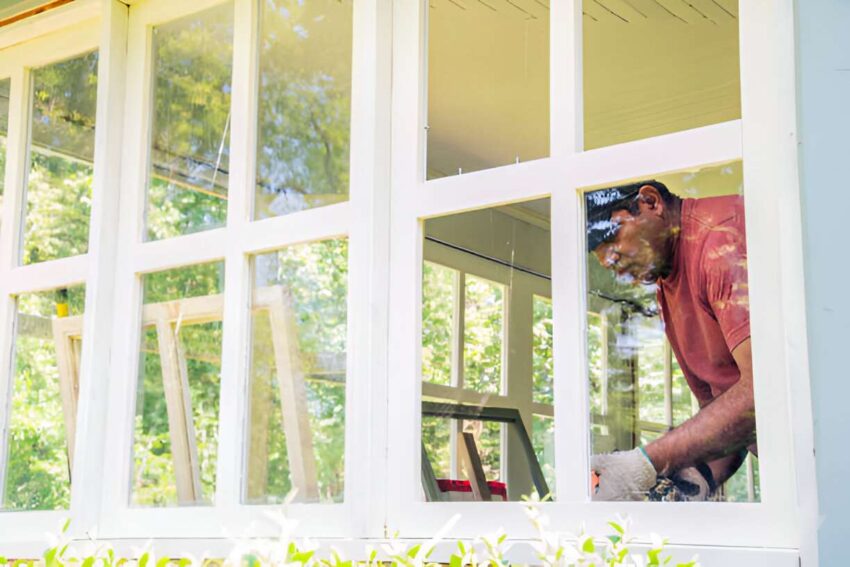Windows are the eyes of your home, offering natural light, ventilation, and a connection to the outdoors. However, as time passes, they can become less efficient, affecting your home’s comfort and energy bills. If you’re considering window replacement, you’re in the right place.
This blog post will shed light on everything you need to know about upgrading your windows, from benefits to costs and everything in between.
Advantages of New Windows
Replacing your old windows can bring a multitude of benefits to your home:
- Enhanced energy efficiency, leading to lower heating and cooling costs
- Improved home security with advanced locking mechanisms
- Increased property value and curb appeal
- Better sound insulation for a quieter indoor environment
- Reduced UV damage to your furniture and flooring
- Easier maintenance and cleaning
- Improved functionality and ease of use
Exploring Window Types
When it comes to window styles, you have numerous options to choose from:
Double-Hung Windows: These classic windows feature two sashes that slide vertically, offering excellent ventilation and easy cleaning.
Casement Windows: Hinged on one side, these windows open outward like a door, providing maximum airflow and unobstructed views.
Sliding Windows: Perfect for wide openings, these windows glide horizontally and are ideal for spaces with limited exterior clearance.
Bay and Bow Windows: These projecting windows create additional interior space and add architectural interest to your home.
Picture Windows: Fixed and non-opening, these windows are designed to frame beautiful views and maximize natural light.
Awning Windows: Hinged at the top, these windows open outward from the bottom, allowing for ventilation even during light rain.
Choosing the Right Materials
Window frames come in various materials, each with its own set of pros and cons:
Vinyl: Affordable, energy-efficient, and low-maintenance, vinyl windows are a popular choice for many homeowners.
Wood: Offering timeless beauty and excellent insulation, wood windows require more upkeep but can last for decades if properly maintained.
Fiberglass: Known for their strength and durability, fiberglass windows resist warping and expansion, making them ideal for extreme climates.
Aluminum: Lightweight and modern, aluminum windows are perfect for contemporary homes but may not offer the best insulation.
Composite: Combining the best qualities of wood and synthetic materials, composite windows offer durability and low maintenance.
Understanding Window Replacement Costs
The cost of window replacement can vary widely depending on several factors:
- Window size and style
- Frame material
- Glass type and energy-efficiency features
- Number of windows being replaced
- Labor costs in your area
On average, you can expect to pay between $300 and $1,200 per window for a standard replacement. However, custom or high-end options can cost significantly more. It’s always wise to get multiple quotes from reputable contractors to ensure you’re getting a fair price.
Window Replacement Process
Here’s what you can expect during a typical window replacement project:
- Initial consultation and measurements
- Selection of window styles, materials, and features
- Ordering of custom-made windows
- Removal of old windows
- Preparation of the window openings
- Installation of new windows
- Sealing and insulation
- Interior and exterior trim work
- Clean-up and final inspection
The entire process usually takes 4-8 weeks from consultation to completion, depending on the scope of the project.
DIY vs. Professional Installation
While some handy homeowners may be tempted to tackle window replacement as a DIY project, it’s generally recommended to hire professionals. Here’s why:
- Proper installation is crucial for energy efficiency and longevity
- Professionals have the right tools and expertise to handle unexpected issues
- Manufacturer warranties often require professional installation
- Improper installation can lead to air leaks, water damage, and other costly problems
If you do decide to go the DIY route, be sure to thoroughly research the process and follow manufacturer instructions carefully.
Energy Efficiency Considerations
When selecting new windows, pay attention to these energy-efficient features:
- Low-E glass coatings to reflect heat
- Double or triple-pane glass with inert gas fills
- Warm edge spacers to reduce heat transfer
- Weather stripping to prevent air leaks
- ENERGY STAR certification for proven efficiency
Investing in energy-efficient windows can lead to significant savings on your utility bills over time.
Choosing the Right Contractor
Selecting a reputable window replacement contractor is crucial for a successful project. Here are some tips:
- Look for licensed and insured professionals
- Check online reviews and ask for references
- Get detailed, written estimates from multiple contractors
- Ask about their experience with your chosen window type
- Inquire about warranties on both products and labor
Don’t hesitate to ask questions and trust your instincts when selecting a contractor.
Maintaining Your New Windows
To ensure your new windows last for years to come:
- Clean frames and glass regularly with mild soap and water
- Lubricate moving parts annually
- Inspect weatherstripping and seals periodically
- Address any issues promptly to prevent further damage
With proper care, your new windows can provide beauty, comfort, and efficiency for decades.
Conclusion
Window replacement is a significant investment in your home, but one that can pay dividends in comfort, energy savings, and property value. By knowing your options, selecting the right products and experts, and maintaining your new windows, you can enjoy this home improvement for years. So, take the leap and let the light in with beautiful, efficient new windows that will transform your living space.

